
In the realm of journalism and LGBTQ+ history, few figures stand as prominently as Randy Shilts. His life and work are the subject of a compelling new book, "When the Band Played On," by Michael G. Lee. This biography delves into Shilts's complicated personal history and his groundbreaking contributions to the media landscape during the AIDS crisis in America.
Born in 1951 in the quiet confines of a small Iowa town, Randy Shilts emerged from a challenging background as the third of six sons to an abusive, alcoholic mother. Her frequent verbal and physical abuse left lasting marks on Shilts, who was often derided as a "sissy," a label that haunted him during his formative years. This early adversity shaped Shilts's character and contributed to his development of an "adultlike impassiveness" and "biting sarcasm," traits he wielded skillfully in his future career as a writer.
Shilts's journey toward self-discovery and identity was, in many ways, marked by a struggle to reconcile his sexuality. As a young man, he navigated the complexities of sexual identity, initially engaging in relationships with women before embracing his identity as a gay man and coming out to his friends. Seeking both educational and personal liberation, Shilts moved to Oregon to attend college as he neared his 21st birthday, driven by a desire to "allow myself love."
His time in Oregon was transformative. He became a vocal activist and soon migrated to San Francisco, a city synonymous with vibrant gay culture. There, Shilts committed to a career in journalism, focusing on narratives that shed light on gay life—stories that were largely invisible to the broader public at the time. He oscillated between Oregon and California, never losing sight of his goal to merge his writing with activism. His work garnered attention among national readers and significant figures within the gay community.
Following the assassination of San Francisco supervisor Harvey Milk, Shilts was selected to write Milk's biography, further cementing his reputation as an authoritative voice on gay issues. By the early 1980s, Shilts had achieved significant professional milestones: he had published a book, secured a radio position, and earned a byline in a national publication, reporting on the burgeoning GRID epidemic—later known as AIDS.
However, Shilts's personal life was not without its perils. As Michael G. Lee recounts in his biography, "When the Band Played On," Shilts was "careless"—just once, but once was enough. In a moment of hindsight, Lee suggests that Shilts's lapse may have led him to join the ranks of those directly affected by the very pandemic he was reporting on. This poignant twist adds an additional layer of complexity to Shilts's narrative.
Lee's book appeals to two distinct audiences: those who lived through the harrowing AIDS crisis and those too young to remember it firsthand but who seek to understand Shilts's instrumental role in chronicling its impact. For both groups, the book is a vital resource, offering a nuanced portrayal of a man who made America take notice of a crisis that many were all too willing to ignore.
Michael G. Lee's "When the Band Played On" is not merely a biography; it is a critical exploration of Shilts's life, highlighting the dual nature of his legacy—a figure both admired and criticized. Lee skillfully navigates the ambiguities of Shilts's decisions and their consequences, leaving readers to ponder the reasons behind his choices and the broader implications of his work. The tension between Shilts's knowledge of safety measures and his apparent disregard for them invites a deeper reflection on human vulnerability and societal pressures.
For scholars and enthusiasts of LGBTQ+ history, Lee's work is indispensable. Moreover, for younger readers unfamiliar with the visceral realities of the AIDS epidemic, "When the Band Played On" serves as an essential reminder of a pivotal era. It is a call to understand the sacrifices and struggles of those who came before and to honor their contributions by continuing the fight for equality and awareness.
Related Posts
Trump Inaugurated as 47th President Amid Concerns for LGBTQ+ Community
Donald Trump has been sworn in as President once again, marking his second term as America's 47th leader. This significant event in U.S. politics promises profound impacts, especially concerning LGBTQ+ rights. Taking office: promises and challenges Amidst a harsh winter storm, Trump took his oath indoors at U.S. Capitol on January 20. Alongside him, Vice-President JD Vance also stepped up, both [...]
Daniel Craig's "Queer" Overlooked by BAFTA: A Surprising Omission
Daniel Craig's film, Queer, snubbed by BAFTAs despite rave reviews In a surprising twist, Daniel Craig's newest film, *Queer*, failed completely on BAFTA's nomination list this year. It's a head-scratcher, considering how critics have sung its praises and Craig delivered such a standout performance. Yet, not a single nod from BAFTA. Go figure. fans and critics baffled by BAFTA snub The exclusio [...]
Generations of LGBTQ+ Athletes: From Past Challenges to Modern Triumphs
In a captivating display that brought together voices across generations, two gay athletes from different times came together on a TV show, sharing their journeys and thoughts on LGBTQ+ representation in sports. This insightful program shed light on how inclusivity and acceptance in athletics have evolved over time. Connecting past and present: The stories behind Andrew Purchas and Davis Atkin L [...]